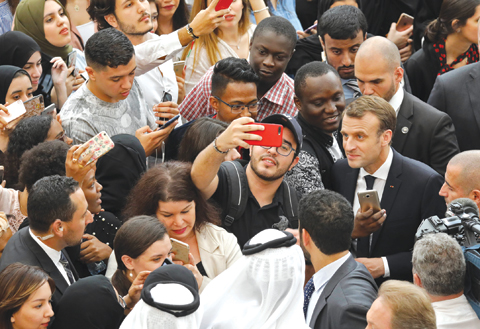President tours French naval base in Abu Dhabi near new Louvre
 ABU DHBAI: French President Emmanuel Macron poses for selfies with students at Paris- Sorbonne University Abu Dhabi yesterday. —AFP
ABU DHBAI: French President Emmanuel Macron poses for selfies with students at Paris- Sorbonne University Abu Dhabi yesterday. —AFP
ABU DHABI: The battle against Islamic State in the Levant is nearing its end, French President Emmanuel Macron said yesterday, but he left the door open to Paris engaging elsewhere to tackle Islamist militant groups if needed.
"We have won the war in Raqqa, and the coming weeks ... will enable us to win completely on a military level in the Iraqi-Syrian zone," Macron said in a speech at a French military base in Abu Dhabi where he is on a two-day visit. France has supplied weapons and training to local forces in Syria and Iraq, has special forces operating in the region and has been one of the main countries bombing militants as part of the US-led coalition. In total, it has some 1,200 troops in its Levant operation.
"This fight will not be finished. In the Gulf, passing through south-east Asia and the Sahel, there are lots of places where the military fight will continue," he said. France's other main area of combat is West Africa, where it has some 4,000 soldiers as part of a counter-terrorism operation against al-Qaeda-backed militants and where there appears little prospect of Paris being able to disengage anytime soon.
Speaking to France 2 television, Macron appeared to go a step further by suggesting that France could be ready to act elsewhere across Africa if required.
"We also have to be very careful about the projects that these Islamist terrorist groups have, such as in the Horn of Africa, Libya and the Sahel. "There will be theatres of operation in which our soldiers are present, such as in the Sahel, but there will undeniably be new battlegrounds against Islamic State, Al-Qaeda or Boko Haram," he said.
Some analysts have warned that France's military is already overstretched, but politicians may find themselves in a position where it is difficult to refuse demands by some of its allies, especially the United States, to commit more troops in areas such as Afghanistan.
Macron visited the naval base at Abu Dhabi's Port Zayed, which sits just across the waters of the Gulf from the new Louvre Abu Dhabi, which he helped inaugurate Wednesday night. The museum's saltshaker-like dome sits in sight of the base. A military band played "La Marseillaise" and an honor guard met Macron before he boarded and walked through the French frigate Jean Bart.
The French president later addressed gathered sailors there. He described the base as a crucial part of France's battle against extremists in the region like the Islamic State group, as well as the effort to stop smugglers and piracy in the Gulf and surrounding waters. "We have won in Raqqa and in the coming weeks, the coming months, I believe it strongly, we will completely win on the military level in the Iraqi-Syrian zone," Macron said, referring to the one-time self-described capital of the Islamic State group.
He added: "France's military capacity is at the heart of my ambitions for our country." He also applauded the cooperation the French military has throughout the region, specifically in the UAE.
The French naval base opened in 2009 and shows France's deepening military cooperation with the UAE, a federation of seven sheikhdoms on the Arabian Peninsula. It also stations troops and planes at Al-Dhafra Air Base, home to some of the 5,000 American troops stationed in the country. Culturally, Abu Dhabi agreed to pay France $525 million for the use of the "Louvre" name for the next 30 years and six months for its new museum, plus another $750 million to hire French managers to oversee the 300 loaned works of art. A center at Paris' Louvre now bears the name of the late UAE President Sheikh Zayed bin Sultan Al Nahyan, which was also part of the deal. -Agencies




